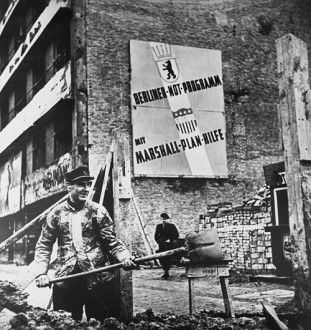Editor’s Blog: 2010
10 March 2010
The Marshall Plan
The reconstruction plan, developed at a meeting of the participating European states, was established on June 5, 1947. It offered the same aid to the USSR and its allies, but they did not accept it. The plan was in operation for four years beginning in April 1948. During that period some US$13 billion in economic and technical assistance were given to help the recovery of the European countries that had joined in the Organization for European Economic Co-operation. This $13 billion was in the context of a U.S. GDP of $258 billion in 1948, and was on top of $12 billion in American aid to Europe between the end of the war and the start of the Plan. The ERP addressed each of the obstacles to postwar recovery. The plan looked to the future, and did not focus on the destruction caused by the war. Much more important were efforts to modernize European industrial and business practices using high-efficiency American models, reduce artificial trade barriers, and instill a sense of hope and self-reliance.
By 1952 as the funding ended, the economy of every participant state had surpassed pre-war levels; for all Marshall plan recipients, output in 1951 was 35% higher than in 1938. Over the next two decades, Western Europe enjoyed unprecedented growth and prosperity, but economists are not sure what proportion was due directly to the ERP, what proportion indirectly, and how much would have happened without it. The Marshall Plan was one of the first elements of European integration, as it erased trade barriers and set up institutions to coordinate the economy on a continental level-that is, it stimulated the total political reconstruction of western Europe.
Belgian economic historian Herman Van der Wee concludes the Marshall Plan was a “great success”:
“It gave a new impetus to reconstruction in Western Europe and made a decisive contribution to the renewal of the transport system, the modernization of industrial and agricultural equipment, the resumption of normal production, the raising of productivity, and the facilitating of intra-European trade.”
I’ve been thinking and worrying about where the UK is heading economically, and why. Do most people fully realise what a parlous state we are in? I suspect not, but I’m sure there is one group of numbnuts who know precisely just how bad things are, and who are largely to blame. For the past 20 odd years British politicians have ruled with one objective in mind, to get re-elected. The UK was already in a downward spiral before Blair came to power in ‘97, but at least public finances were in control with income matching expenditure, and by maintaining the previous government’s budgets for a further two years, the financial health of the nation remained acceptable. The Bank of England was also given independent power to control interest rates which took that political weapon out of the re-election equation, and the country was at last in a period of sustained, realistic interest rates and low inflation. However, Brown also blunted BOE regulatory teeth and effectively started the biggest borrowing and spending spree in the country’s history, without trying to tackle the country’s fundamental trading problems, and failure to exchange the pound for the Euro. The final nails in the coffin were Blair’s personal ambitions, and his intimate relationship with George W Bush.
In short, the UK is now well and truly fucked, and with an election looming large the major parties show no sign of proposing radical measures to get the country back to even moderate even-keel. For example: How does the country’s industrial sector recover and grow? How much longer will the pound be hung out to dry? How can the taxation system become fairer and much simpler? How will the economy get back into financial balance?
WE NEED A MARSHALL PLAN. WE NEED ALL THE MAJOR POLITICAL PARTIES TO CREATE IT, AGREE IT AND IMPLEMENT IT.
And incidentally, don’t think that the Stock Market is a reliable guide to the way the ecomony is moving. Only 25% of the City of London’s vast turnover is made up of share transactions, and traders are looking for a quick buck, every minute of every day. A more realistic guide to how we are fairing is the value of pound stirling, and that folks sums things up succinctly and accurately: we are going down the tubes fast. And don’t be fooled by economists saying that a lower pound means more competitive UK exports. For years now we have been importing much more than we export, and are now at an all-time, negative imbalance of payments. The decimated pound means we are paying more for imports that have become the country’s industrial and retail lifeblood. Looked at your fuel bills and petrol pump prices recently? The pound has plummeted against the dollar and euro, the two major trading currencies, and will continue to dive as the politicians shuffle the chairs on the decks of the Titanic to appear electable. And while our economy crashes, every day more young British soldiers lives are being criminally wasted for a dubious cause few understand, or accept. It’s just not rock ‘n’ roll is it? And what do we concern ourselves with acccording to the tabloids? Cheryl Friggin’ Cole’s marriage! We reap what we sow…
Page: 1 2 3 4 5 6 7 8 9 10 11 12 13 14 15 16 17 18 19 20 21 22 23 24 25 26 27 28 29 30 31
|
|

|

Rise Against |
LATEST GALLERY IMAGES

Where Israel Goes, Misery Follows 
The Kanneh-Masons |
|
|



